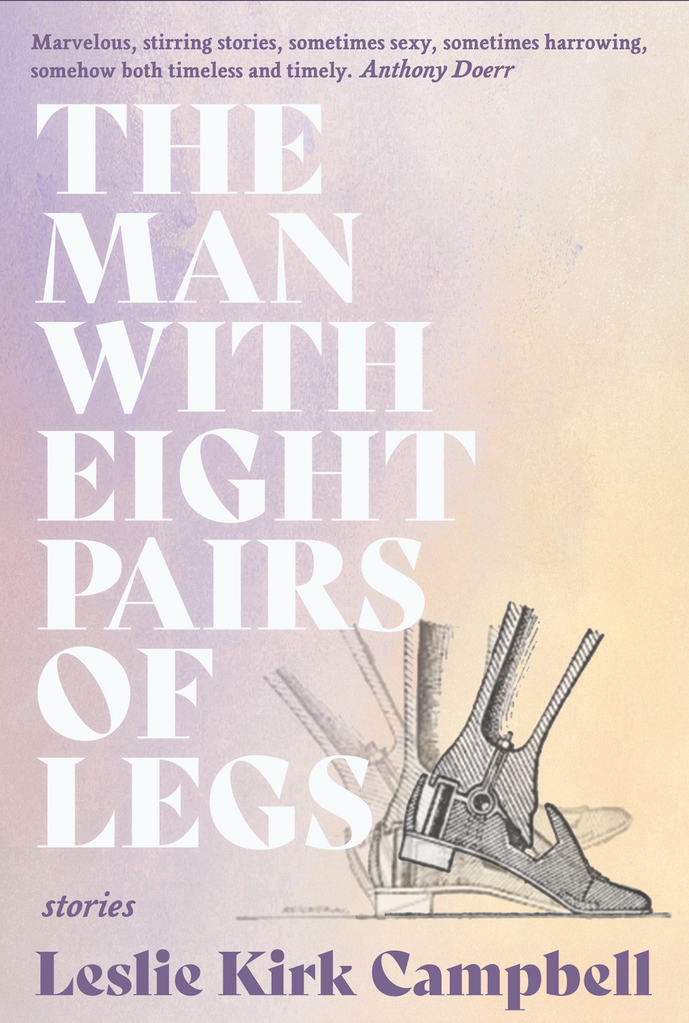The Man with Eight Pairs of Legs, stories by Leslie Kirk Campbell
Sarabande Books (February 1, 2022)
Paperback, 240 pages
EAN/UPC – 9781946448880
Esquire magazine recently declared, “When crafted well, short stories are like grenades which quickly explode in front of us,” and indeed, some of the most innovative and engaging fiction appears in short story form. Indie publishers have been champions of the short story, and of books that tap into the cultural and literary moment—and among the terrific releases from indie publishers this month is Leslie Kirk Campbell’s debut story collection, The Man with Eight Pairs of Legs. This collection of richly imagined stories was awarded the Mary McCarthy Prize in Short Fiction from Sarabande Books in 2020, and is Campbell’s fiction debut.
Anthony Doerr, who won the Pulitzer Prize for All the Light We Cannot See, says of the collection, “History and memory crosscut through The Man with Eight Pairs of Legs in a gorgeous weave. These are marvelous, stirring stories, sometimes sexy, sometimes harrowing, somehow both timeless and timely…” and Publishers Weekly calls the collection an “engaging debut…marked by surprising encounters and poignant reflections.”
In the title story, Harriet Rogers, a too-tall, rawboned high school teacher who’s lived with body shame most of her life, falls for Callahan, a local mineworker she meets one night in the local bar, and whose prosthetic legs she discovers later that night when they climb into bed. Set in Cañon City, a small town at the foot of the Sawatch Range in central Colorado, the story mines the intersection of able-bodiedness and disability and intolerance of the other. The couple, both outsiders, are a flashpoint in the town, but they keep to themselves as Callahan’s resolute attitude about his body bumps up against Harriet’s inward, complicated one:
“He called them his phantoms, which made perfect sense. She’d searched, but had repeatedly failed to find the locus of her own indelible suffering, an ache that seemed to reach far beyond the bitterness still lingering from a childhood of mockery. And yet, if she paid attention to it, the pain seem to spread everywhere, like miniature firing squads beneath her clothes.”
Callahan is the victim of a local mine explosion, and as his relationship with Harriet grows, he unveils numerous pairs of prosthetic legs—the eight pairs of the book’s title. Harriet is slightly jealous, seeing in his engineered limbs an ideal an able-bodied person could never possess. Callahan, as it turns out, wants to run in the Human Race, a yearly marathon in Cañon City, its first-ever competitor with prosthetic limbs. The tensions that surface as Callahan trains force the couple to reconcile their individual histories with the future they might have together.
“Thunder in Illinois” centers on the weekly word game of a long-married Midwestern couple, Mr. and Mrs. Evans, but in reality, the game is a backdrop for the struggle of the husband’s longtime infidelity and the terminal illness he’s battling. That premise might sound bleak, but the story’s stylish, wry voice, and banter between the couple reveals a rich vein of friction. As the game unfolds, we’re shown the attachment, and the complexity, of a long marriage:
He can’t remember when she first said he was the cause of her loneliness. He holds tight to the blame. He doesn’t mean to, but at night when he and Mrs. Evans turn on the fan and lie back against the coolness of the sheet on separate sides of their king-sized bed, he often feels it in his blood and smells its rotten scent.
Mr. Evans knows he must give up his affair with Vilai, the Thai woman he’s been supporting in Bangkok (met on one of his frequent business trips to Asia), and reconcile his life with Mrs. Evans, a woman who is not altogether easy—but characters who are easy and lives that are smooth are not Campbell’s territory. There’s a wisdom in this story, one that centers on the links between free will and consequence, a wisdom Mrs. Evans has and one for Mr. Evans to discover: “‘The flap of a moth in Bangkok,’ says Mrs. Evans. ‘Makes for thunder in Illinois,’ says Mr. Evans.”
In “Overture,” a woman victimized by domestic violence, Margie, is confined to her house by a controlling husband, and with two school-age children to raise, lives a half-life in her suburban tract. Her youthful self, a young woman of opinions and an ambition “to sing bel canto like Maria Callas,” is reduced to a small memory inside her, but one that still animates and sustains: “…all the arias I haven’t sung are fire in my throat.” Margie is a fragile figure, nearly broken, and from an often-harrowing first-person point of view, Campbell shows us Margie’s degradation, silence, and sense of invisibility. When Mark, the husband, makes a rare allowance for the family to attend a school event, Margie realizes there’s no one who’ll even think to ask her “…why are you wearing sunglasses inside?”
That same buried intensity occurs in “Nightlight.” Reiner, a father, husband, and tech professional in San Francisco, unexpectedly comes upon a ragged young man, Federico, who’s been squatting in the vacant house next door. Living an upscale life, Reiner has lost touch with the questioning youth he’d been in his native Germany (“He recalled words now—Dichtung—the feathery air, the angst he felt in those days like small animals in his throat”), who still reveres philosophers like Büchner and Celan, and rediscovers them in the graffiti scrawled on the walls of the abandoned house. Federico, who knows his German existentialism, intellectually seduces Reiner, gaining not only a spiritual confidante but a source of ready cash. The two spent nights pondering German philosophy in the squalid house, and Federico uses Reiner’s money to fund a heroin habit while delivering him to a dark place that threatens his conventional life.
The collection’s closing story, “Triptych,” a beautiful piece set in 1984, centers on loss and illness. Llyn, an artist and pregnant single mother, lives in a San Francisco apartment next door to Grady Delacroix, a gay man dying of AIDS. Told from multiple points of view—Llyn’s, Grady’s, and Llyn’s boy, Cash—covers six years, the span of Grady’s illness and death, and Cash’s birth and early childhood. It’s a stunning portrait of how three lives, and three forms of need, define a found family.
The book’s epigraph, by Henry David Thoreau, underscores the collection’s exploration of the body and how life is written upon it: “I stand in awe of my body, this matter to which I am bound has become so strange to me.” The determination of Callahan, the forced choices of Mr. Evans, the will Margie finds to extricate herself and her children from harm, all find their locus in the idea of the body as messenger, as matter that brings both helplessness and power, a means of release, a source of grace. As one character says, “Ash, it turns out, is an aphrodisiac for wildflowers and grasses. The dead amongst the living…” These stories, ambitious in scope, at once gritty and lavishly told, set a clear-eyed beam on their characters, and in prose as careful as it is exact, Campbell taps that fierce instinct to regenerate, and show us how ash sparks life.
Leslie Kirk Campbell is also the author of Journey into Motherhood: Writing Your Way to Self-Discovery (Riverhead), and numerous personal and political essays. Her award-winning short fiction has appeared in such journals as Ploughshares, Southern Indiana Review, Briarcliff Review, and Arts and Letters. She is a longtime instructor of creative writing in San Francisco.
The Man With Eight Pairs of Legs launches February 1, and is available for pre-order now.



